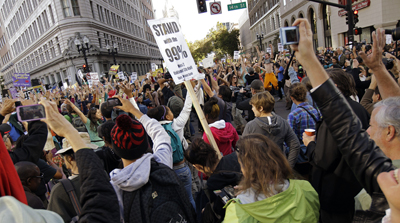As the Occupy movement has spread beyond Wall Street, at least seven U.S. journalists have been detained and one television crew attacked by U.S. law enforcement officers during turbulent encounters between police and protesters. Occupy demonstrators have attacked journalists in two other instances, including an assault this week in Oakland, Calif., that left a cameraman with a concussion.
The attack on KGO cameraman Randy Davis is the most serious anti-press case to be reported in relation to the Occupy protests. About a dozen men assaulted Davis on Thursday as he was trying to film the aftermath of a fatal shooting at a protest site. “Some members of the movement became hostile to the media trying to document the scene,” KGO reported, adding that Davis was punched several times in the head.
In New York, a crew from TV Fox 5 news was hit by pepper spray and police batons as protesters broke past barriers and police sought to contain them, according to news reports. “We got caught up in the middle of things,” reported journalist Dick Brennan, who was struck in the stomach by an officer’s baton during the October 5 incident. A police spokesman told Fox 5 the assault was “inadvertent.” Another Fox 5 News reporter, John Huddy, said a demonstrator threatened him and ripped away his microphone on October 28; police later arrested the assailant.
More common have been instances in which reporters and photographers were cuffed and booked as police rounded up groups of protestors demonstrating in allegedly unauthorized places. Press accreditation is at the center of several of these arrests. In New York and elsewhere, police have refused to acknowledge as a journalist anyone who does not have what they consider to be official accreditation. That’s left freelancers and journalists for new media vulnerable to arrest–and has effectively put police in the role of deciding who can cover the news. Erika Fry explored the issue in depth in the Columbia Journalism Review.
In New York, three journalists said they were arrested because they did not possess specific (and restrictive, according to some) police-authorized press passes. John Farley, a reporter with the WNET/Thirteen blog MetroFocus, was arrested and charged with disorderly conduct while covering a march in the city, although the charge was later dropped. Kristen Gwynne, a freelancer for the news website Alternet, and Natasha Lennard, a New York Times freelancer, were arrested on the same charges when they were caught in a police cordon while covering a march on the Brooklyn Bridge. Their cases are pending, according to CJR. All three had some sort of press identification, just not the tightly controlled NYPD accreditations.
Freelance journalist and cartoonist Susie Cagle, who was arrested on November 3 while covering the Occupy Oakland protests and held for 15 hours, told me that arresting officers belittled her press pass and told her they had “never heard of” the mostly online publications to which she contributes, including Alternet and Truthout, along with Good magazine and Citizen Radio. Cagle said she has been charged with “presence at the scene of a riot” and is awaiting her arraignment next month. (Of course, any reporter doing her job covering a protest could be subject to such a charge.)
In Nashville, Tenn., reporter Jonathan Meadlor of the weekly Nashville Scene was conducting interviews at an Occupy demonstration on October 29 when he was arrested along with a group of protestors. In video footage, Meadlor can be heard repeatedly telling officers “I’m a member of the media,” to which he gets no response. Another voice is then heard saying, “When you get him up there charge him with resisting arrest.” Ian Graham, a photographer for RVA Magazine, was arrested on October 31 on charges of trespassing on a public street while photographing an Occupy Richmond event. He had left a police-designated media area, according to the Richmond Times-Dispatch.
In one case, the failure of police to recognize press status was particularly baffling. On November 2, Milwaukee Journal Sentinel photographer Kristyna Wentz-Graff was detained while photographing an Occupy protest at the University of Wisconsin-Milwaukee. The Journal Sentinel reported that Wentz-Graff was photographing police officers arresting demonstrators when she was grabbed and handcuffed herself. Milwaukee police spokeswoman Anne Schwartz said later: “I can tell you that no one at MPD had any idea [Wentz-Graff] was a journalist until she arrived here at the police station. She never identified herself as a journalist to officers.” Mayor Tom Barrett later came to the veteran photographer’s defense, saying it should have been obvious to the arresting officers that Wentz-Graff was a photojournalist. The evidence that convinced him was apparently provided by the local press corps, who filmed and photographed Wentz-Graff being handcuffed with large cameras and a press pass swinging prominently around her neck. The photographer was later released without charge.
